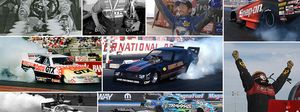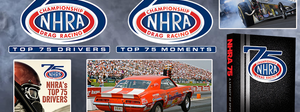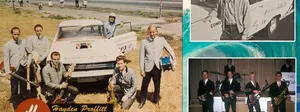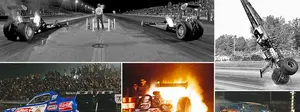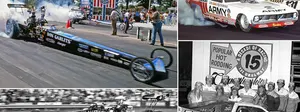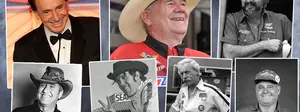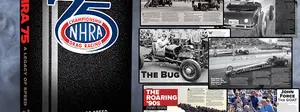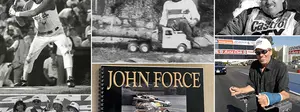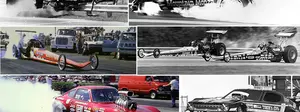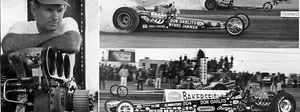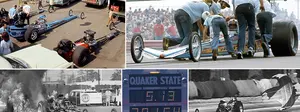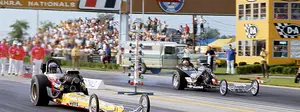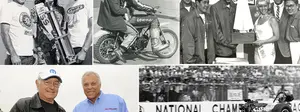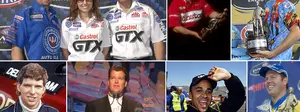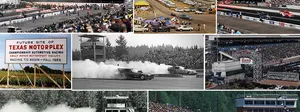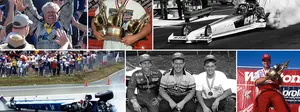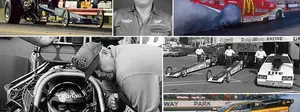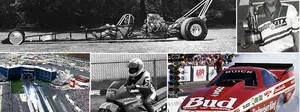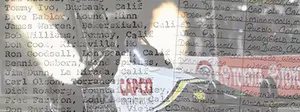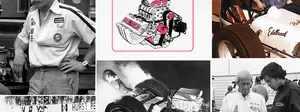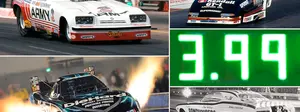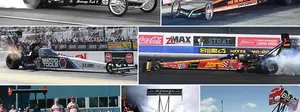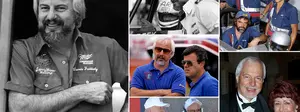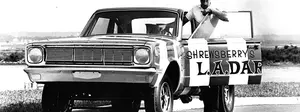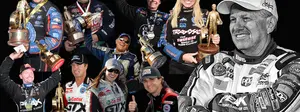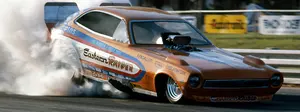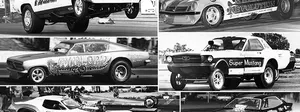Another Memorable Motorplex Moment
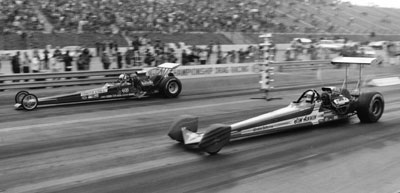
First Top Fuel five: Missed it
|
|
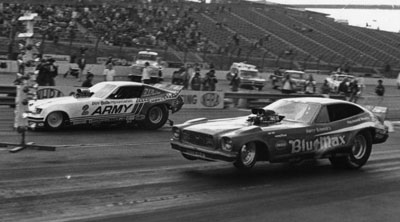
First Funny Car five: Ditto
|
|
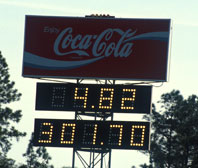
First 300: Not present
|
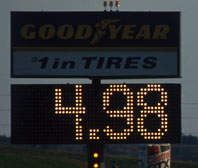
First Funny Car four: Nope
|
In 40-plus years of attending the drags, I’ve seen some incredible things. I’ve watched dramatic championship chases come down to thrilling winner-take-all final rounds, seen the greats of the sport in their heyday, and was even there for the end of the front-engine Top Fuel era.
If there's a glaring hole in my race-going résumé, it certainly falls under the category marked “barriers.” John Force could probably drive his whole fleet of semitrucks through it side by side.
First six-second Top Fuel run? Before my time. First five? Didn’t make it to Ontario that year. First four? Happened at the Motorplex during its brief IHRA reign. First six-second Funny Car run? East Coast. First five? Another missed Ontario opportunity. First Funny Car four and 300-mph pass? Wasn’t my turn to work the Topeka event that year. First Top Fuel 300? Not my turn for Gainesville that year. First Funny Car three? Yeah, just missed that one, too (I went to events on either side of the Charlotte event). First Pro Stock 200-mph pass? Nope.
About the only major barrier breaker I did see was Kurt Johnson felling the six-second mark in Pro Stock in Englishtown. Still, I don’t feel cheated (much).
This thought comes to mind after my trip last weekend to Dallas for the AAA Texas NHRA Fall Nationals, where forecasted hot weather made it clear that the fabled Texas Motorplex would have a tough time dishing out the records for which it’s become known. Short straw? Hardly.
As thrilled as my Charlotte-scheduled staffers no doubt were to witness Matt Hagan’s three-second flopper pass, I felt that I ended up with the more memorable weekend after watching long-suffering Bob Vandergriff Jr. win his first national event. Thirteen previous times (14 if you count the no-points Top Fuel vs. Funny Car Winston No Bull Showdown in 1999), he had been to the final and was turned away every time. Few can forget his first final-round loss when the parachute inexplicably deployed at midtrack against Larry Dixon at the 1995 U.S. Nationals, and since then, he has lost in every way you can imagine, including one final where the supercharger rotors had been put into the case backward. They don’t work too well that way.
After Indy, it was disappointments in Houston and Brainerd in 1997, Columbus in 1998 and 1999, Phoenix in 2000, and Reading in 2004. In 2007, he was runner-up five (five!) times: in Las Vegas, Bristol, Sonoma, Dallas, and Pomona at the Finals (think he was hating 2007?). Earlier this year, unlucky 13 was lost in Topeka to Spencer Massey. He has lost to the best of them. Four times to Tony Schumacher. Twice to Dixon and Brandon Bernstein, and to Kenny Bernstein and Joe Amato. To Cory McClenathan and Doug Herbert.
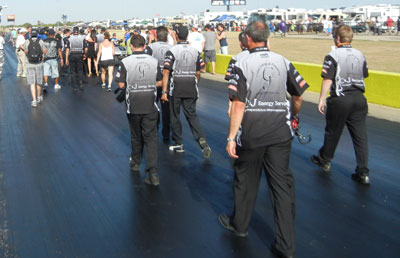 |
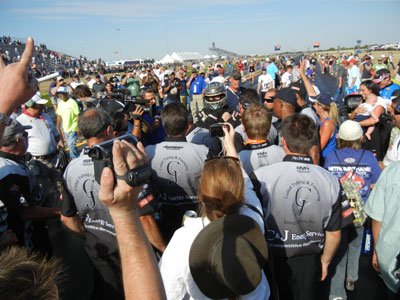 |
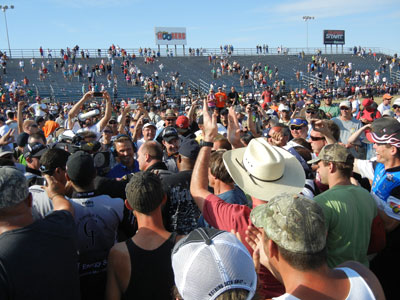 |
As I wrote in this week’s Launch Pad in National DRAGSTER, I don’t think that prior to the final in Dallas, too many people were rooting against Vandergriff. Had he not just taken over the points lead the round before, even final-round foe Massey might have rooted for him.
Both went up in smoke – Massey early and Vandergriff later – but Bobby V got ‘er through there almost sideways to light the win lamp, setting off an unforgettable final-round celebration that will always be my “Garlits shaves at Indy” (yeah, I was too young to see that one, too).
After a boisterous starting-line celebration, the crew started walking down the track. I didn’t understand what was going on, but I started to follow. Had their car lost something going down the track? Was there a question about Vandergriff crossing the centerline (with his luck, that was certainly possible). Then I heard that Vandergriff was running back to meet them.
I looked over, and the crowd was spilling over the chain-link fences and running to the guardwalls. The Sportsman winners were high-fiving him as he passed them in the shutdown area. It was still about 100 degrees, and here comes Vandergriff – in full firesuit and helmet – hoofing it our way. I started firing off photos of this stunning scene; the fans jumping the wall and milling on the track reminded me of fans spilling onto the track at Lions and OCIR after their Last Drag Races.
Vandergriff was engulfed in a wave of humanity when the two sides finally met. Fans were shooting photos and videos and chanting “Finally!” Everyone was a Bob Vandergriff Jr. fan. It was definitely the feel-good moment of the year and one for my personal memory bank.
“It’s been something that’s been in the works for like five years and probably 10 finals,” he admitted later. “I always said that when I finally did win, I didn’t want to be down there by myself listening to the crickets and have my guys jumping around on the starting line. I’ve had Brandon Bernstein and J.R. Todd on standby with a scooter for every final round I’ve been in to get me back to the starting line so that I could celebrate with my crew. Unfortunately, before the final, Brandon texted me and said, ‘Hey, my baby’s hot and I’ve got to get back to my mom’s house,’ and J.R.’s not racing with us right now, so I was on my own. I told my guys that after we win this round, I’m coming back to you, so meet me halfway. I crossed the finish line and pulled the brake as hard as could, stopped the car, and off I went to the starting line. It was something I’d been waiting to do for a long time, and it’s something that I’ll never forget.
“It’s been really difficult. In other sports, I’ve always won and done really well. I was all-state in football and basketball in high school, and I’m a scratch golfer and play in a lot of tournaments, so I’m very competitive, and to come out here and have so many variables that are out of my control while trying to build that same kind of program has been really hard. You see guys win that you don’t think are as good as you are, and you think, ‘Man, I should be able to do that,’ and it eats at you.”
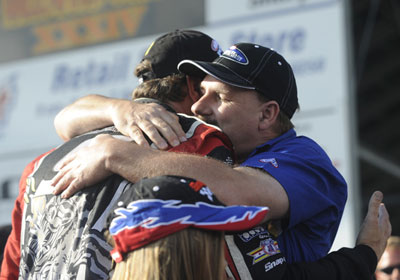 |
It wasn’t as emotionally shaking as seeing Doug Herbert win in Norwalk in 2008 just months after losing sons Jon and James in a car accident, but it was close. Herbert’s win was different because it was both joyful and sad because we all had to reflect on why it was such an amazing moment (I’m a softy, but I cried mostly because the big lug just about broke my ribs with this hug at right in the winner’s circle), while the Vandergriff celebration was just pure joy that he’d finally done it.
Vandergriff’s win led me to dig through the record books for others who had suffered repeated final-round losses before they scored their first, and until Vandergriff lost for the 10th time (Sonoma 2007), John Force – of all people – was the poster child for frustration after nine straight final-round losses before his first win, in Montreal in 1987. (Hey, I was there, too. Maybe I should rent myself out to the next luckless soul.) And we all know how that ended up for late bloomer Force. Ditto for Schumacher, who went 0 for 8 but now has 67 wins. Below are other legendary winless skeins, reported with first final, number of runner-ups before a win, first win, and current number of Full Throttle wins.
| Name | Class | First final | R/Us | First win | Wins |
| John Force | FC | Baton Rouge, La. 1979 | 9 | Montreal 1987 | 133 |
| Scott Geoffrion | PS | Houston 1991 | 9 | Memphis, Tenn. 1993 | 9 |
| Tony Schumacher | TF | Indy 1996 | 8 | Dallas 1999 | 67 |
| Dave Grubnic | TF | Houston 1998 | 8 | Topeka 2005 | 2 |
| Steve Johnson | PSM | Richmond, Va. 1995 | 7 | Madison, Ill. 2004 | 5 |
| Eddie Krawiec | PSM | Sonoma 2007 | 6 | Atlanta 2009 | 10 |
| Erica Enders | PS | Chicago 2005 | 5 | ?????? | 0 |
Obviously, that's some good company there. Enders is the highlight here, well-overdue for her first Pro win (let’s not forget that she won in Super Gas way back in 2004), and Krawiec the historic footnote for winning the Pro Stock Motorcycle championship in 2008 without winning an event, matching the feat accomplished by Rob Bruins nearly 30 years earlier. My guess is that Enders breaks her winless streak in Las Vegas this year ... because I'll be there. Remember, you read it here first.

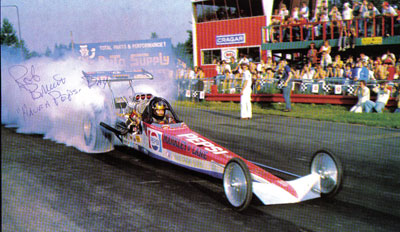 |
Speaking of Bruins, I received this scan of a 1977 hero card from Vic Miller after my column about Bruins’ rough go in Funny Car and his much happier times in Top Fuel. Bruins had signed it in the tire smoke for Miller, who grew up just down the road from then Seattle Int'l Raceway and spent the best part of his childhood and teenage years there collecting handouts.
I passed it on to Bruins, who replied that although it’s the car he drove that year in his first season for car owner Gaines Markley, that’s actually Markley in the car.
“As you can see, the car is lettered Markley & Lane. Norm Lane had actually secured the Pepsi sponsorship for his own car, and when his driver, Tom Christenson, rolled his car at the first race out, he had no car to complete his contract with, so he partnered up with Gaines so Pepsi was represented on a race car. Lane had spent most all of the sponsorship money buying an engine from Herm Petersen, so Gaines really only got a paint job for the car and truck and trailer and Pepsi product for the rest of the year with hope of a renewed sponsorship deal for the next year (which didn't happen).
“Lane never attended a single race and had nothing to do with running the car. We finished the year with that car and then had Al Swindahl build the new car we went on to win the championship in. Having Al build that car was an entire story in itself. We really wanted another Woody car, but Woody had quit building cars; we were hesitant to have Al build one because up until then, everything he built was a Don Long clone (we respected Don Long's design and craftsmanship but really liked some of Woody's features and concepts). We each had chassis ideas we would not compromise on and had to pick and choose our battles in order to create what turned out to be a somewhat unique car when it came out of Al's shop.”

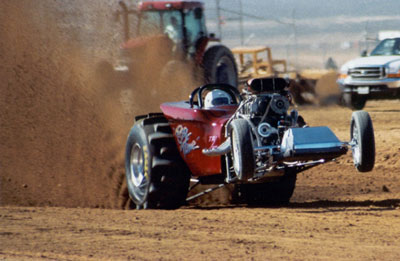 |
And furthermore …
Speaking of Bruins, I got an email from Washingtonian Rick Gilchrist, who wanted to let me know that the Green Elephant Funny Car that Bruins drove lives on, albeit as a sand drag car chassis fielded by Carey Mahoney of Battle Ground, Wash. Gilchrist has worked on the car, hence the insider tip.
I visited Mahoney’s website, where I discovered that the car, now named Big Time, is classified as a Top Alcohol Funny Car and sports a ’23-T body over the old chassis and an all-aluminum 500-cubic-inch Chevrolet engine, blown and injected on methanol. On his website, Mahoney, who has been involved in sand drag racing since 1974 and has been president of the NSCA (National Sand Competition Association) and the NWSCA (Northwest Sand Competition Association), reports that he got the car from Jim Griner in 1998, who purchased it from the late Lynn Redeman, who bought it from the Greens.
Like they say, old race cars never die …



